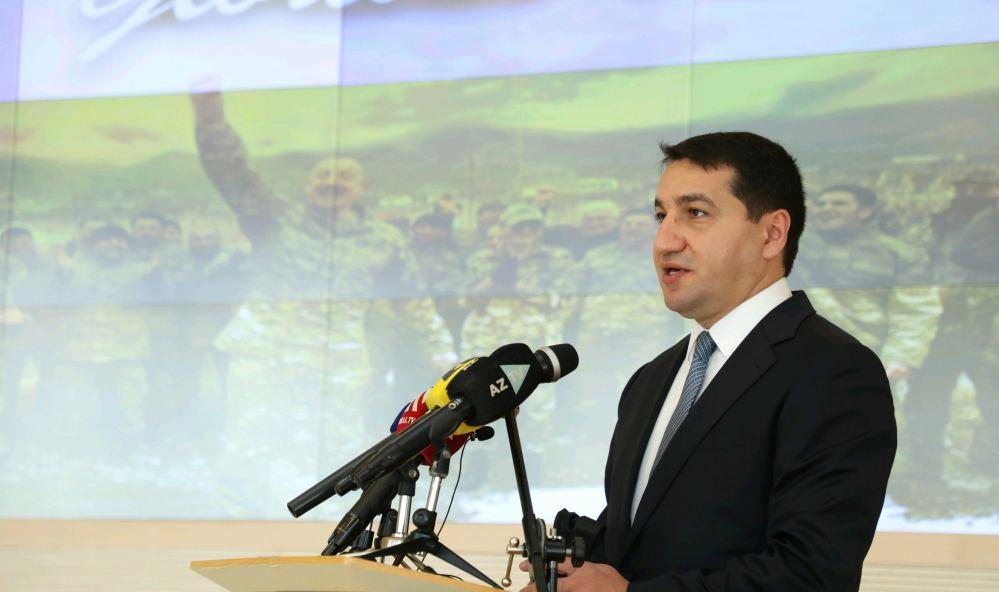Azerbaijan's foreign policy to further serve int'l law, peace, security

By Vafa Ismayilova
Presidential aide Hikmat Hajiyev has said that Azerbaijan's foreign policy, which is based on national interests, will continue to serve to ensure international law, peace, and security in the region and worldwide.
He made the remarks on July 12 at the ceremony to open the Week of Diplomacy devoted to the 44-day Karabakh war and Azerbaijan's post-war foreign policy.
Hajiyev underlined that the event's opening day coincided with the date when Armenia resorted to another provocative act on Azerbaijan's state border in Tovuz region.
“The Azerbaijani armed forces gave a worthy rebuff to all military provocations of the Armenian armed forces and the Great Victory gained by the Azerbaijani heroic army under the command of Azerbaijani President Commander-in-Chief Ilham Aliyev as a result of the 44-day Armenia-Azerbaijan Karabakh War was inscribed in golden letters in Azerbaijan's history,” he said.
The presidential aide said that the conflict is in the past and added that the main tasks before Azerbaijan are demining, the restoration of the Azerbaijani lands liberated from the Armenian occupation and ensuring the safe and dignified return of internally displaced people to their native lands.
Meanwhile, the Azerbaijani Foreign Ministry reported on its website that the Diplomacy Week attended by representatives of volunteer organizations and movements operating in Azerbaijan will continue until July 26.
For two weeks, the participants will meet high-ranking officials from the Foreign Ministry and other state agencies, Azerbaijani ambassadors in foreign countries, the Patriotic War veterans, foreign journalists covering the war, well-known public figures to get detailed information about Azerbaijan's foreign policy during the war and the glorious Azerbaijani army's historic victory. In addition, the project envisages a number of cultural programs, excursions, and trips.
The cross-border clashes between Azerbaijan and Armenia started on July 12 noon after Armenian troops fired artillery at the Azerbaijani military position in Tovuz.
The Azerbaijani armed forces retaliated destroying a stronghold, bombshells, vehicles, and servicemen on the territory of Armenia’s military unit by using artillery, mortars, and tanks on the night leading to July 13. Azerbaijan also downed three Armenian UAVs.
Azerbaijan lost 12 servicemen, including an army general in the clashes that lasted from July 12 to July 16. The Armenian armed forces, which have been shelling civilians in villages in Tovuz, killed an Azerbaijani civilian in the region's Aghdam village on July 14.
Many experts believe that the cross-border clashes in Tovuz led Azerbaijan to its imminent victory in the 44-day war with Armenia in 2020.
The clashes between Armenia and Azerbaijan resumed after Armenia launched large-scale attacks on Azerbaijani forces and civilians on September 27. The 44 days of war ended with the Russian-brokered peace deal signed on November 10, 2020, by the Azerbaijani, Russian and Armenian leaders.
The peace agreement ended the 30-year conflict between Baku and Yerevan over Azerbaijan’s Nagorno-Karabakh region that along with the seven adjacent districts came under the occupation of Armenian armed forces in the war in the early 1990s.
For about three decades, Armenia failed to implement the UN Security Council resolutions demanding the withdrawal of the Armenian troops, which was the main obstacle to the resolution of the conflict.
--
Follow us on Twitter @AzerNewsAz
Here we are to serve you with news right now. It does not cost much, but worth your attention.
Choose to support open, independent, quality journalism and subscribe on a monthly basis.
By subscribing to our online newspaper, you can have full digital access to all news, analysis, and much more.
You can also follow AzerNEWS on Twitter @AzerNewsAz or Facebook @AzerNewsNewspaper
Thank you!
